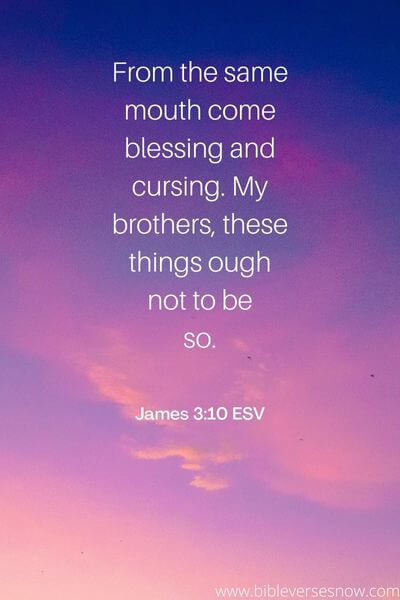Swearing can be used for a variety of reasons, such as expressing strong emotions, emphasizing, or as a form of rebellion. However, it is generally considered impolite to swear in most social situations and can be considered a form of verbal abuse in some contexts.
It is also important to note that what is considered offensive can vary greatly between cultures and societies.
Bible Verses on swearing
The Bible specifically forbids the use of certain words, including blasphemy (taking the Lord’s name in vain) and other words that are disrespectful or vulgar.
Other Christians may believe that it is not the specific words themselves that are sinful, but the attitude or intent behind them.
In Christianity, the use of profanity or swear words is generally considered a sin, as it goes against the teachings of respect, kindness, and purity of speech.
Many Christians believe that using swear words shows a lack of self-control and that it is not in line with the example set by Jesus Christ.
In any case, it is generally considered more appropriate for Christians to use language that is respectful and uplifting, rather than language that is vulgar or offensive.
The Bible has several verses about swearing and using profanity;
Ephesians 4:29
Let no corrupting talk come out of your mouths, but only such as is good for building up, as fits the occasion, that it may give grace to those who hear.-

This verse is a call to refrain from using offensive or profane language, including swear words, as it can be seen as corrupting talk that does not build up or give grace to others.
Instead, the verse encourages the use of language that is positive and uplifting for the benefit of others.
The verse also suggests that our speech should be chosen carefully, based on the context and audience, in order to bring grace to those who hear it.
James 5:12
But above all, my brothers, do not swear, either by heaven or by earth or by any other oath, but let your “yes” be yes and your “no” be no, so that you may not fall under condemnation.-

This verse is instructing believers not to swear or make oaths, but to be truthful and honest in their speech.
The idea is that if one’s word is always true, there is no need to swear or make oaths to confirm the truth of what is being said. Instead, one’s “yes” should always mean “yes” and one’s “no” should always mean “no”.
By doing this, one avoids the danger of falling under condemnation for making false oaths or breaking promises.
James 3:10
From the same mouth come blessing and cursing. My brothers, these things ought not to be so.-

This verse is making the point that it is inconsistent and hypocritical for a person to speak blessings and curses from the same mouth.
It’s asking believers to be consistent in their speech and avoid using their words for both good and evil.
It is not specifically talking about swearing but rather how we use our words in general, it’s emphasizing the importance of being mindful of how we speak, and to be careful not to curse or use our words in a harmful way.
Ephesians 5:4
Let there be no filthiness nor foolish talk nor crude joking, which are out of place, but instead let there be thanksgiving.-

This verse is calling on believers to avoid using vulgar or offensive language and to instead use their speech to give thanks and express gratitude.
The word “filthiness” can also be translated as “obscenity” or “coarse jesting”, which refers to the use of vulgar or profane language.
As a believer, you must be mindful of their speech, and avoid using language that is inappropriate or offensive. Instead, one should use their words to express gratitude and give thanks.
Proverbs 4:24
Put away from you crooked speech, and put devious talk far from you.-

This verse is encouraging us to avoid using deceitful or misleading language. The phrase “crooked speech” can also be translated as “perverse language” or “deceitful words” which refers to the use of speech that is intentionally misleading or deceitful.
What Bible Verse talks About Swearing
The Bible does not have a specific commandment that says “thou shall not swear”, but it does have several passages that address the use of language and how it should be used.
In general, the Bible encourages the use of truthful and honest speech and discourages the use of vulgar or offensive language, deceitful or misleading language, and language that is morally or ethically wrong.
Matthew 5:33
He says: “Again you have heard that it was said to those of old, ‘You shall not swear falsely, but shall perform to the Lord what you have sworn.’ But I say to you, Do not take an oath at all.-

Jesus teaches that the act of swearing is not necessary if you speak truthfully all the time.
Jesus is also teaching us not to swear by anything, whether it be heaven, earth, Jerusalem, or even by one’s own head, for none of these things are in our control and it’s impossible for us to make one hair white or black.
Bible Verses on Swearing of Oath
Oath swearing is the act of making a solemn promise or commitment to do something, often accompanied by an invocation of a higher power or a sacred object, as a way to confirm the truth or sincerity of the promise.
Many cultures, oath swearing is a traditional way of making a binding commitment or attesting to the truth of a statement.
The Bible discourages the use of oaths in speech, as it implies that one needs to swear to confirm the truth of what is being said, and instead, one’s word should always be enough.
Matthew 5:36-37
And do not take an oath by your head, for you cannot make one hair white or black. Let what you say be simply ‘Yes’ or ‘No’; anything more than this comes from evil.-

This passage is teaching that it is not necessary to swear oaths in order to confirm the truth of what is being said.
Jesus is saying that one’s word should be enough and that the act of swearing an oath is unnecessary.
He is teaching that if one’s word is always true, there is no need to swear or make oaths to confirm the truth of what is being said. Instead, one’s “yes” should always mean “yes” and one’s “no” should always mean “no”. By doing this, one avoids the danger of falling under condemnation for making false oaths or breaking promises.
James 5:12
But above all, my brothers, do not swear, either by heaven or by earth or by any other oath, but let your “yes” be yes and your “no” be no, so that you may not fall under condemnation.

This verse is instructing believers not to swear oaths, but to be truthful and honest in their speech. The idea is that if one’s word is always true, there is no need to swear or make oaths to confirm the truth of what is being said.
Instead, one’s “yes” should always mean “yes” and one’s “no” should always mean “no”. By doing this, one avoids the danger of falling under condemnation for making false oaths or breaking promises.
Exodus 20:7
You shall not take the name of the Lord your God in vain, for the Lord will not hold him guiltless who takes his name in vain.-

This verse is one of the Ten Commandments, and it is instructing the Israelites not to use the name of God in a disrespectful or frivolous manner.
The Hebrew phrase “to take the name of the Lord in vain” can also be translated as “to swear falsely by the name of the Lord”.
This commandment prohibits the misuse or profanity of God’s name, it is a warning against profanity, blasphemy, and false oaths.
Bible Verses on not swearing
Not swearing refers to the practice of refraining from using profanity or vulgar language, as well as not making oaths or promises.
It is the act of being mindful of one’s speech and avoiding the use of language that may be offensive or disrespectful.
2 Timothy 2:16
But avoid irreverent babble, for it will lead people into more and more ungodliness.-

It is not good to speak in a way that is empty or meaningless, or that does not reflect a godly character.
It is also a warning that such kind of language can lead people into more ungodliness.
James 4:7
Submit yourselves therefore to God. Resist the devil, and he will flee from you.-
It’s important to remember that our words and actions should always reflect our submission to God.
If we are truly submitted to God, we will be more likely to use our words in a way that is pleasing to Him and that reflects His character.
What Does the Bible Say about Swearing on the Bible in Court
Swearing on the Bible in a court of law is a traditional practice that dates back centuries, where a witness or defendant is asked to place their hand on a Bible and swear to tell the truth, the whole truth and nothing but the truth.
This practice is a way to assure the court that the testimony given will be truthful and accurate.
This practice is based on the belief that God is a witness to the oath, and that someone who swears falsely on the Bible is committing a grave sin.
This practice is also grounded in the belief that the Bible is the word of God, and that by placing one’s hand on it, they are symbolically placing themselves under the authority of God, and therefore under an obligation to tell the truth.
Proverbs 12:22
Lying lips are an abomination to the Lord, but those who act faithfully are his delight.-
This verse is emphasizing the importance of being truthful when giving testimony or making oaths.
It’s a reminder that bearing false witness or lying under oath is an abomination to the Lord, and that truthful and honest speech is what pleases God.
The practice of swearing on the Bible in court is a way to assure the court that the testimony given will be truthful and accurate, but the main goal is to ensure that the testimony is truthful, rather than the specific religious book or text used.
What does the Bible Say about Swearing on Someone’s Life?
Swearing on some other person’s life implies that one is willing to put their own life on the line to confirm the truth of what they are saying, or to ensure that they will fulfill a promise.
According to the Bible, it is very wrong to swear and let alone swear on someone’s life It is not appropriate to swear on someone’s life.
Matthew 5:36-37
And do not take an oath by your head, for you cannot make one hair white or black. Let what you say be simply ‘Yes’ or ‘No’; anything more than this comes from evil.-
If the bible speaks against swearing by your head, how much more swearing on a person’s life?
it’s not necessary to swear by anything or anyone else to confirm the truth of what is being said.
is swearing a sin yes or no
Yes, swearing, using foul language/cursing are considered a sin.
The Bible speaks of sin as failing to love God and love His people. We are called to speak out of a heart that builds up, encourages, and keeps others from harm.
Swearing, or using bad language, is not mentioned as a sin directly in the bible, but it is mentioned numerous times in the Bible.
Using foul language is a clear violation of Scripture and is considered a sin.
Romans 12:14
Bless those who persecute you; bless and do not curse.-
The meaning of Romans 12:14 is to bless those who persecute you and not curse them. Using foul language/cursing is considered a sin according to these verses, so the answer is yes.
Cursing, or using vulgar or offensive language, is not in line with the character of God and is not an appropriate way to speak.
Instead, we should be using our words to bless others and to reflect the love and kindness of God.
Bible Verses to Stop Swearing
Swearing can be harmful to your relationships and communication and it can limit your vocabulary.
To help stop swearing, you can start by avoiding saying swear words yourself and setting a good example for those around you.
You can also have a swear jar at your desk and put money in it every time you slip up.
Finally, if you hear someone else swearing, you can respond but try to do it in a non-confrontational way.
Here are bible verses that can help to stop swearing;
Matthew 5:37
Let what you say be simply ‘Yes’ or ‘No’; anything more than this comes from evil.-
Jesus is teaching here that we should not have to swear oaths at all and that our words should be true and straightforward.
He is stressing the importance of speaking the truth and not exaggerating or making false claims.
The Bible is very clear that swearing should not be done. Jesus said, “Do not swear an oath at all.
The Bible also says that cursing and profanity are offensive to God and that people who use such language will be judged.
The Bible encourages us to use words that build up and encourage others.
We should use words that are true, honorable, just, pure, lovely, commendable, and excellent.
Finally, it is important to remember that what comes out of our mouths is an indication of what is in our hearts.







